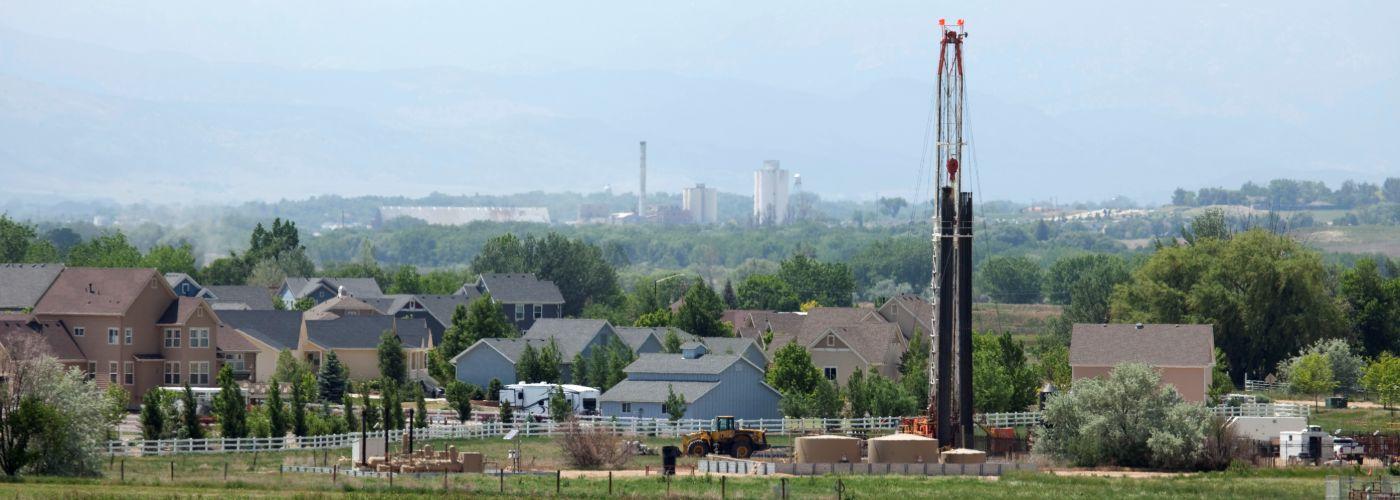Oil and gas and your health

Oil and gas activity releases air pollutants that can impact health. The Oil and Gas Health Information and Response (OGHIR) program aims to:
- Provide objective health information
- Evaluate the levels of air pollutants near oil and gas activity
The program includes experts in oil and gas operations, air quality measurement, exposure assessment, toxicology, and health communication.
Colorado is the seventh largest energy producing state in the nation. Most of this energy comes from oil and gas (US Energy Information Administration, 2022). This means many people live near oil and gas activity.
Oil and gas activity releases air pollutants. These pollutants include particulate matter and volatile organic compounds (VOCs), such as benzene and toluene. Pollutants are released at higher levels during pre-production phases. Emissions typically decrease after early stages of production.
Emissions from oil and gas activity have impacts seen at different levels.
- In your area, oil and gas activity may increase the risk of headaches, dizziness, respiratory, eye, and skin irritation from short-term exposures to air pollutants.
- At a regional level, emissions from oil and gas are a significant contributor to ozone formation. These emissions (e.g., VOCs and nitrogen oxides) make up about 40% of the compounds from human activity that lead to ozone formation. Across the Front Range, ozone reaches unhealthy levels. Breathing too much ozone is riskier for people with asthma, children, older adults, and people who exercise outdoors.
- On a global scale, greenhouse gasses from oil and gas activity contribute to climate change. Coloradans have experienced the impacts of climate change, including forest fires, floods, and severe drought. More adverse weather events can have harmful health effects.
More information
Scientists continue to learn how living near oil and gas activity may impact human health.
- Many research studies find that living near oil and gas activity may be tied to asthma, preterm birth, low birth weight, and other health impacts. However, scientists do not know the specific cause of these outcomes.
- A recent analysis suggests that living near oil and gas activity can have similar health effects to living near a busy highway.
- Community members who live near oil and gas activity often report headaches, eye irritation, and nausea.
Residents living near oil and gas activity may not experience any health symptoms. Health effects depends on many factors, including:
- What you're exposed to.
- How you're exposed.
- How much, how long, and how often you are exposed.
Not all people have the same risk. Age, gender, genetics, lifestyle, and other factors play a role in how exposure to a toxic substance impacts health. It is difficult to determine if a single symptom is related to oil and gas activity. It can be helpful to record your symptoms and changes in your environment, like odors or sounds. This can help identify sources of exposure.
For medical emergencies, call 911. See a health care provider if your symptoms get worse, don't go away, or disrupt your daily activities. Otherwise, you can report a health or odor concern online or by calling us at (303) 389-1687.
More information
Complaints about noise and odor are the most common reports from people living near oil and gas activity. To limit your exposure:
- Close your windows, if possible.
- Try noise canceling headphones, earplugs, or white noise machines to help with sleep.
- Consider activated carbon filters to reduce the levels of air pollutants in your home.
- Use HEPA filters to remove smoke or fine particles. This can be especially useful during wildfire season.
- Track your symptoms and changes in your environment to help us evaluate trends with nearby oil and gas activities.
- Check the air quality near you using EPA's AirNow or CDPHE's air quality dashboard.
More information
We use several different methods to collect air quality measurements. These include our Colorado Air Monitoring Mobile Laboratory (CAMML) and Mobile Oil/Gas Optical Sensor of Emissions (MOOSE). In other cases, we use small sensors to measure overall levels of volatile organic compounds (VOCs). Sensors can detect changes in air quality, but they cannot directly account for health risks. Sometimes we pair sensors with canisters to collect an air sample. Then we send the air sample to a lab for analysis. We evaluate the data from the lab to identify potential health risks.
We compare the amounts of compounds we measure to health guideline values (HGVs). These levels are set by federal and state agencies to identify levels of pollutants that may cause health impacts. If we measure a pollutant above a HGV, it is not directly tied to regulatory actions. Instead, it identifies that more investigation is needed. You can review our assessments on our community investigations page.
Oil and gas operations are mainly regulated at the state level. Watch this presentation for more information.
- The Energy and Carbon Management Commission regulates oil and gas activities in Colorado through enforcement, hearings, orders, policies, and rules.
- The Air Quality Control Commission develops air pollution control policy, regulates pollution sources, and conducts hearings involving violations of the state's air pollution laws.
- Regulation 7 addresses emissions from oil and gas operators. You can view the Regulation 7 Air Quality Monitoring Records Map to learn more or access related records.
Air quality
Oil and gas development
Spills
- Colorado Emergency and Incident Reporting Line (24 hour) 1-877-518-5608
Waste Management
Water
Contact
Oil and Gas Health Information and Response Program
4300 Cherry Creek Dr S
Denver, CO 80246
303-389-1687
cdphe_oghealth@state.co.us